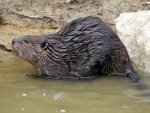 The North American Beaver (Castor canadensis) lives in Canada, most of the United states and Northern Mexico. It is the second largest rodent in the world, the largest rodent in the world is the capybara. The North American Beaver has webbed hind feet for swimming and unwebbed front paws (clawed, used for digging and carrying material for dams for example). In some areas they are viewed as pests, because they flood rivers with their dams and are very persistent to repair any damage to the dam. Most of the time, the only way to stop them is to move them to another location. Predators of the North American Beaver are the Red Fox, Gray Wolf, Bobcat and the Coyote.
The North American Beaver (Castor canadensis) lives in Canada, most of the United states and Northern Mexico. It is the second largest rodent in the world, the largest rodent in the world is the capybara. The North American Beaver has webbed hind feet for swimming and unwebbed front paws (clawed, used for digging and carrying material for dams for example). In some areas they are viewed as pests, because they flood rivers with their dams and are very persistent to repair any damage to the dam. Most of the time, the only way to stop them is to move them to another location. Predators of the North American Beaver are the Red Fox, Gray Wolf, Bobcat and the Coyote. Image by LASZLO ILYES (laszlo-photo) from Cleveland, Ohio, USA, licensed under Creative Commons Attribution 2.0 License
Which zoos have them?
Smithsonian National Zoological Park (United States)The American beaver is listed as Least Concern (LR/lc), lowest risk. Does not qualify for a more at risk category. Widespread and abundant taxa are included in this category, on the IUCN Red List of Threatened Species
Namings for the American beaver
A young / baby of a American beaver is called a 'kit kitten or pup'. A American beaver group is called a 'family or colony'.Some facts about the
American beaver
Adult weight : 20.25 kg (44.55 lbs)
Maximum longevity : 23 years
Female maturity :639 days
Male maturity : 639 days
Gestation : 128 days
Weaning : 60 days
Litter size : 4
Litters per year : 1
Interval between litters : 365 days
Weight at birth : 0.43 kg (0.946 lbs)

Custom Search